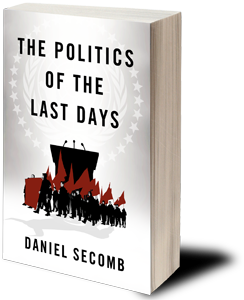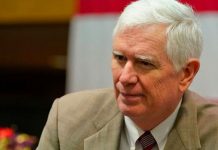The growing socialist wing of the Democratic Party will flex its muscle Thursday with the seating of the new Congress, as more self-described Democratic Socialists join the ranks and dozens of sitting and incoming members – including likely 2020 hopefuls – embrace a massive government expansion that would make FDR look like a penny pincher.
The party agenda is increasingly embracing big-government policies like “Medicare-for-all” and guaranteed jobs programs — as well as an aggressive “Green New Deal” that would include all this and more as part of a fundamental overhaul to America’s economy and specifically its energy sector.
It’s unclear when and if any of them will make it to the floor, let alone pass the House. But their growing support marks an astonishing rise for socialist-leaning policies in just a few years, and reflects a shift in the party itself. A stunning Gallup poll last summer showed Democrats view socialism more positively than capitalism. The term “Democratic Socialist” was only broadly popularized with the 2016 presidential run of Bernie Sanders, who identifies as one. The enthusiasm behind his bid underscored how ideas that once marinated on the party’s fringe were increasingly becoming mainstream.
Now, two more Democratic Socialists will join Sanders in Congress on Thursday — Reps. Alexandria Ocasio-Cortez, D-N.Y., and Rashida Tlaib, D-Mich. Ocasio-Cortez has embraced the mantle, while Tlaib is a member of the Democratic Socialists of America (DSA). And while Ocasio-Cortez and Tlaib represent only a sliver of the Democratic Party’s new majority in the House, they have attracted outsized media attention and are pushing policies with dozens of supporters.
Medicare-for-all in particular is quickly picking up support. A New York Times analysisfound that one-third of Senate Democrats and more than half of House Democrats have endorsed Medicare-for-all proposals — including a number of possible 2020 presidential hopefuls. Such proposals would lead to more government involvement in health care, and bring the U.S. a step closer to mostly socialized systems such as the British National Health Service. Their popularity is driven by frustration with the current private insurance system, which remains costly on the individual market despite ObamaCare’s goals. And while Medicare-for-all is estimated to cost tens of trillions of dollars over a decade, advocates argue some of this would replace out-of-pocket expenses already being shouldered by millions of Americans.
But even more ambitious than Medicare-for-all is what’s known as the Green New Deal. While echoing the language of President Franklin Delano Roosevelt’s New Deal, the Green New Deal could be an even more sprawling government and economic overhaul. Championed by groups such as the Sunrise Movement and Justice Democrats, the plan would aim to combat both climate change and income inequality – and has been picked up by lawmakers such as Sanders and Ocasio-Cortez.
“We are calling for a wartime-level, just economic mobilization plan to get to 100% renewable energy ASAP,” Ocasio-Cortez tweeted.
If your 2020 platform doesn’t include a Green New Deal, are you really running for President? 😉
Thank you @ewarren! https://t.co/A2rfUIu2iS
— Alexandria Ocasio-Cortez (@AOC) January 2, 2019
A draft text circulated around Congress calls for a select committee to be formed to create a plan, and lays out a framework that includes eliminating greenhouse gas emissions from manufacturing and agriculture and “dramatically” expanding energy sources to meet 100 percent of power demand through renewable sources.
If that wasn’t ambitious enough, the proposal describes this as “a historic opportunity to virtually eliminate poverty in the United States and to make prosperity, wealth and economic security available to everyone participating in the transformation.”
On the economic front, it also demands a job guarantee program that offers “a living wage job to every person who wants one,” a “just transition” for workers affected by climate change, basic income programs, universal health care “and any others as the select committee may deem appropriate to promote economic security, labor market flexibility and entrepreneurism.”
In at least a partial nod to the presumably mammoth cost that overhauling the nation’s economy and energy sector would entail, it says that the financing of “the Plan” would be accomplished by “the federal government, using a combination of the Federal Reserve, a new public bank or system of regional and specialized public banks, public venture funds and such other vehicles or structures that the select committee deems appropriate, in order to ensure that interest and other investment returns generated from public investments made in connection with the Plan will be returned to the treasury, reduce taxpayer burden and allow for more investment.”
Indeed, the question that has long dogged such proposals is how to pay for it all. But the answer has typically avoided specifics, instead arguing that America has found ways to pay for other gargantuan costs in the past. In a follow-up FAQ, one explainer says the plan would be funded by “the same ways we paid for World War II and many other wars.”
“The Federal Reserve can extend credit to power these projects and investments, new public banks can be created (as in WWII) to extend credit and a combination of various taxation tools (including taxes on carbon and other emissions and progressive wealth taxes) can be employed,” it says.
Conservatives warn these ambitious programs, though, would do generational damage to the U.S. economy.
“Together, Ocasio-Cortez’s proposals would effectively eliminate fossil fuels from most of society, destroy millions of jobs and trillions of dollars of wealth, require ‘upgrading’ every home and business in America, create a national federal jobs-guarantee program, impose single-payer health care (costing trillions more), establish a new system of publicly owned banks, run up the national debt by countless trillions of dollars, and move the United States closer than ever to socialism,” Justin Haskins, a research fellow at the Heartland Institute, wrote in an op-ed for Fox News. “If we don’t stop it, it will destroy our economy for a whole generation of Americans.”
Some liberal commentators have warmed to the proposals. The New York Times’ Paul Krugman said it wasn’t clear what the Green New Deal meant, “which is what makes it a good slogan.”
Such a sweeping policy would almost certainly be dead on arrival as long as Republicans control at least one chamber of Congress or the White House. Krugman noted the political realities for the left, arguing that Democrats can’t enact such a plan this year “but they should start preparing now, and be ready to move in two years.”
But regardless of how much progress these proposals might make on the House floor, they’re already part of the 2020 conversation. Sen. Cory Booker, D-N.J., who has been tipped for a White House bid, said last month that he is “excited” to support the Green New Deal.
The Chicago Tribune reported that Sen. Kamala Harris’, D-Calif., staff have been in touch with the organizers behind the Green New Deal. Axios reported Wednesday that Sen. Elizabeth Warren, D-Mass., who just launched an exploratory committee for a presidential run, supports a Green New Deal.
“Senator Warren has been a longtime advocate of aggressively addressing climate change and shifting toward renewables, and supports the idea of a Green New Deal to ambitiously tackle our climate crisis, economic inequality, and racial injustice,” an aide told the outlet.
Warren, Harris and Booker have also backed separate Medicare-for-all plans.
In the House, the Sunrise Movement says that it has more than 40 House members who are backing the Green New Deal, including Reps. Tulsi Gabbard, D-Hawaii, Joe Kennedy, D-Mass., Ted Lieu, D-Calif., and Veronica Escobar, D-Texas.
However, Democratic leadership has been cautious about adopting such proposals. Roll Call reported that Rep. Frank Pallone, D-N.J., who is set to be the Energy and Commerce Committee chairman, said he supports the idea of Medicare-for-all but doesn’t think the votes are there.
Earlier this week, House Democrats formalized proposals for a new committee on climate change, but without the features that proponents of a Green New Deal have sought — such as the power to subpoena and the authority to vote on legislation and send it directly to the House floor.
A sign of possible tensions within the party was on display in November, when environmental activists took part in a sit-in outside Speaker-designate Nancy Pelosi’s, D-Calif., office, demanding leadership do more to promote the Green New Deal.
Joining the protesters was Ocasio-Cortez, who said: “We need to tell her that we’ve got her back in showing and pursuing the most progressive energy agenda that this country has ever seen.”
Source: Fox News
 Register your interest for Daniel Secomb's new book, "Politics of the Last Days"
Register your interest for Daniel Secomb's new book, "Politics of the Last Days"
Daniel's new book explores the integral and fascinating role that politics will play in the end times.
He demonstrates that political philosophy is actually underpinned by biblcal principles and that by examining the political history of the past can give us a fascinating glimpse into how Biblical end times events will unfold.
Be sure to sign up with your name and email address to be notified of updates and the upcoming release date of the book.



















